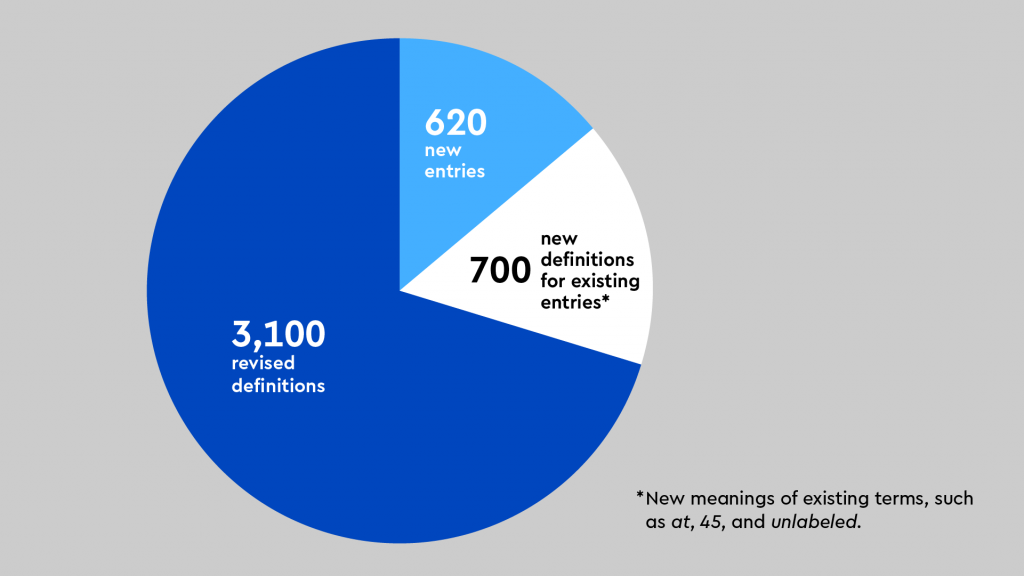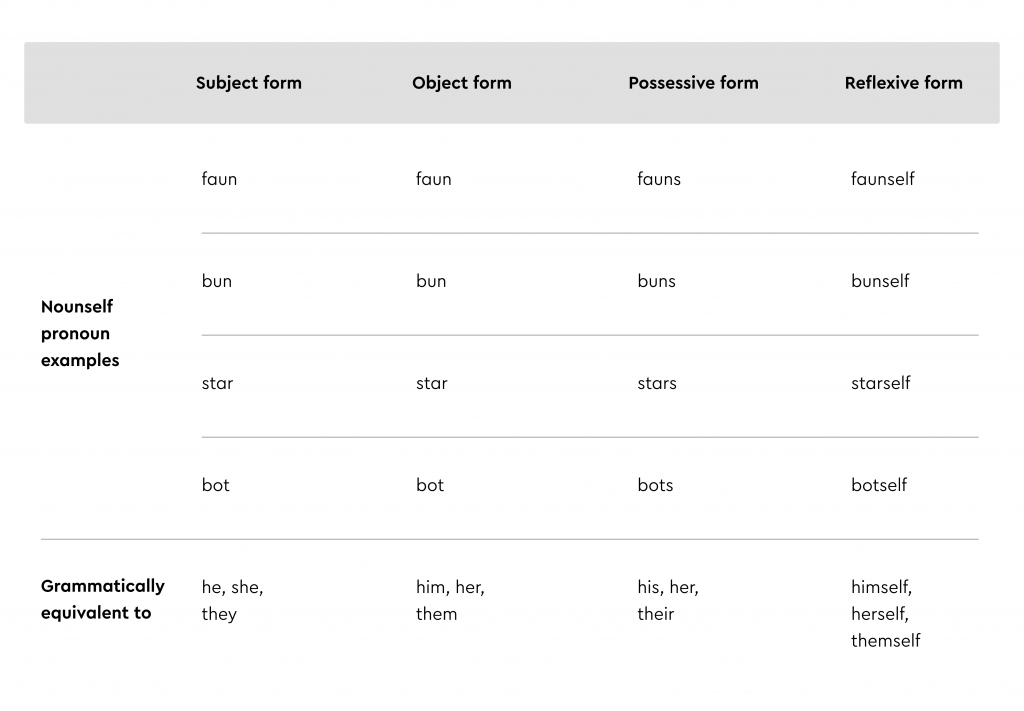Having a good vocabulary is important to facilitate speaking, reading, writing, and listening in any language.
Here are 60 new words in English with meanings to include in your list today!
Table of Contents
- An overview of new words in English
- Importance of new words in English
- New words in English (A-E)
- New words in English (F-J)
- New words in English (K-O)
- New words in English (P-T)
- Bonus words
- Key Takeaways
- FAQs
An overview of new words in English
Statistics by the Global Language Monitor (GLM) have revealed that there are approximately 1,019,729 words in the English language. The GLM also estimates that a new word is created almost every 98 minutes around the world! Being well-informed on the new words in English that have been added to recent editions of dictionaries can help you strengthen your vocabulary. Educators around the world classify vocabulary into four key types – listening vocabulary, speaking vocabulary, reading vocabulary, and writing vocabulary.
Importance of new words in English
The need to be able to communicate as clearly, concisely, and efficiently as possible has only been highlighted by the COVID-19 pandemic. With a significant portion of our daily life shifted online, having a remarkable collection of words to use in English can help create excellent language skills.
If you have decided to update your current vocabulary, here are 60 new words in English with meanings to help you refine your language skills!
| WORD | MEANING | |
| 1. | Abnegation | Denial; renunciation of a doctrine or belief. |
| 2. | Ambigue | An ambiguous expression or statement. |
| 3. | Athleisure | Comfortable and casual footwear & clothing designed for exercise and rigorous activity. |
| 4. | Broigus | Angry or irritated. |
| 5. | By-Catch | A catch of fish that cannot be put to commercial use. |
| 6. | Blert | A cowardly person, someone who is weak. |
| 7. | Comp | Providing products or services free of charge as a token of appreciation, a favor. |
| 8. | Cryptocurrency | Virtual or digital currency used on the internet. (This is among the new words in English that have emerged as a result of technological advancements in the industry of finance.) |
| 9. | Cringe | To feel ashamed or embarrassed by what someone else is doing or saying. |
| 10. | Deepfake | A recording or image that has been altered convincingly to misinterpret what someone is doing or saying. (This is among the new words in English that have emerged as a result of technological advancements in the industry of finance.) |
| 11. | Delicense | To deprive a vehicle, business, or person of their license (official permission to operate). |
| 12. | Destigmatizing | The process of removing social stigma or negative connotations associated with someone or something. |
| 13. | Eradicate | To destroy something completely down to its roots. |
| 14. | Ebullient | Unrestrained joyously. |
| 15. | Efface | To remove, typically by erasing or rubbing. |

New words in English (F-J)
| WORD | MEANING | |
| 16. | Fantoosh | Showy; flashy; stylish; exotic; sophisticated. Used often to imply pretentiousness & ostentation. |
| 17. | Functional | Capable of or designed for a particular purpose. |
| 18. | Fatuous | Devoid of intelligence. |
| 19. | Gratuitous | Unwarranted or uncalled for. |
| 20. | Gaffe | A tactless or socially-awkward act. |
| 21. | Galvanize | To stimulate action. |
| 22. | Hench | A person with strong musculature; an individual with a remarkable physique. |
| 23. | Hir | A gender-neutral adjective is used to indicate possession. |
| 24. | Hair Doughnut | A doughnut-shaped sponge used to support a specific hair-do. |
| 25. | Influencer | An individual who changes or affects the way a larger group of people behave. |
| 26. | Infirm | Lack of vitality, or bodily & muscular strength. |
| 27. | Incessant | Without any interruption. |
| 28. | Jovial | Displaying high-spirit merriment. |
| 29. | Jaunt | A journey taken typically for pleasure. |
| 30. | Jaded | Apathetic or bored after experiencing an excess of something. |
New words in English (K-O)

| WORD | MEANING | |
| 31. | Kwell | To talk proudly, admiringly, or enthusiastically about something. |
| 32. | Knell | The sound of a bell rung very slowly; a toll. |
| 33. | Kip | Informal word for ‘sleep’. |
| 34. | LOL | Abbreviated form for ‘Laugh Out Loud’. Used commonly for communicating informally on social media platforms. |
| 35. | Lethargy | To display an unusual lack of energy or inactivity. |
| 36. | Largesse | Generosity or kindness in bestowing money or gifts. |
| 37. | Multifarious | Diverse, or multifaceted. |
| 38. | Municipal | Related to a self-governing district. |
| 39. | Microfinance | Financial services that are provided to individuals & communities in rural & developing areas. |
| 40. | Nomophobia | Anxiety about lack of access to a smartphone or mobile phone services. |
| 41. | Naivete | Lack of worldliness & sophistication. |
| 42. | Nascent | The beginning; being born. |
| 43. | Onboarding | The process of integrating a new employee into a team or organization. |
| 44. | Oat-Milk | Milk prepared from oats; used commonly in cooking and in drinks. |
| 45. | Onset | The early stages, or beginning of. |
New words in English (P-T)
| WORDS | MEANING | |
| 46. | Pronoid | A person who is convinced of others’ goodwill towards themselves. |
| 47. | Puggle | A young platypus or echidna. |
| 48. | Pertinacious | Someone who is stubborn & unyielding. |
| 49. | Quotidian | An event or task that is of daily occurrence. |
| 50. | Quisling | A traitor. (This word is also among the list of 50 difficult words in the English language!) |
| 51. | Quaff | To swallow greedily or hurriedly in a single draught. |
| 52. | Rat-Tamer | Informal for a psychiatrist or a psychologist. |
| 53. | Recalcitrant | Resistant to authority or force. |
| 54. | Raconteur | A person who is skilled in telling anecdotes. |
| 55. | Sandboxing | The restriction of a code or piece of software to a specific environment on a computer system that can be run securely. |
| 56. | Self-isolate | To deliberately isolate oneself from others; to undertake a period of self-imposed isolation. |
| 57. | Shero | A heroine; a hero of the female gender. |
| 58. | Topophilia | An emotional connection to a physical environment or a particular place. |
| 59. | Truthiness | Something of a seemingly truthful quality that is not supported by evidence or facts. |
| 60. | Tract | An area of land that is extended. |
Bonus words
- Abrogate– To revoke something formally.
- Abstruse– Difficult to understand.
- Accede- Yield to anothers’ wish or opinion.
- Blandishment– Flattery intended to persuade.
- Calumny– A false accusation of an offense.
- Circumlocution– An indirect way of expressing something
- Demagogue– A leader who seeks support by appealing to popular passions
- Enervate– Weaken physically, emotionally, or morally.
- Sesquipedalian– A foot and a half long.
- Supercalifragilisticexpialidocious– Something that is extraordinarily good.
Key Takeaways
- There is a constant introduction of new words in English added to dictionaries every year.
- Updating your vocabulary is an excellent way to communicate effectively.
- Vocabulary is recognized as of four types – reading, speaking, listening, and writing.
- The above list of words is a great way to improve your all-rounded vocabulary and knowledge of new English words!
We hope you enjoyed reading this blog. In case of any queries, reach out to us or drop a comment below!
Liked this blog? Read 5 English learning books to boost your language skills
FAQs
Q1. How can I learn new words daily?
Answer – Reading different kinds of material and literature is an excellent way to learn new words. Keep a dictionary handy, so you can refer to the meanings of the words. This can also help you remember them easily.
Q2. Why has there been a surge in the new words added to dictionaries every year?
Answer – Technology has played a significant role in promoting the spontaneous coining of new words. This is largely due to the need to communicate quickly and efficiently.
Q3. What are ‘portmanteau’ words?
Answer – ‘Portmanteau’ words or ‘blended’ words are words that combine the meaning of two discrete terms. For example – the word ‘bromance’ is a blend of the words ‘brother’ and ‘romance.’
Antiwork, bachelorx party, 45, Ohtani rule, pawternity leave, Zelenskyy. As ever, there is great variety in the new terms and meanings just added to Dictionary.com.
by Nick Norlen, Senior Editor, and Heather Bonikowski, Lexicographer
Let’s set things straight: a word doesn’t become a “real word” when we add it to the dictionary. It’s actually the other way around: we add a word to the dictionary because it is a real word used by real people in the real world.
And you—the real people in this real, complicated world—have been busy generating a wildly diverse assortment of new words and new ways to use existing words for countless aspects of our modern life.
As always, we’ve been keeping track. That’s our job! The work of a dictionary is to document these changes.
Learn more about how new words get added to Dictionary.com—and how the dictionary works.
Many of the words may be new to you. Others you have already been using for some time. (Don’t at us.) Either way, that’s how words work. That’s how the dictionary works. We strive to keep pace with the ever-changing English language—a language whose changes come from you, the people who use it.
What’s in this dictionary update
This update is not just new entries. It also includes, as always, new and revised senses of existing words in our dictionary. Here’s the breakdown for this release:
Our lexicography team has also recently begun to do the work of revising entries for Ukrainian place names and the names of Indigenous Peoples. You can read about both below in the special section titled “Endonyms & Exonyms.”
Now, let’s get to the newly added words and meanings. Note that many of these terms have more than one definition. We’ll be highlighting the most prominent or notable meanings relevant to this release.
Lie Flat
verb. to reject overwork and withdraw voluntarily from relentless competition and pressure to achieve.
🧐 Editor’s note: The term comes from—and is also a synonym for—the name of the movement known as Lying Flat that originated in China.
antiwork
adjective. of or relating to a social and cultural movement that distinguishes between labor, which generates goods, and work, which generates wealth, and that rejects work as artificially incentivized, while embracing or elevating labor as essential or intrinsically rewarding.
churn rate
noun. the percentage of employees that leave a company in a given period of time, or the rate at which any group loses members.
golden handcuffs
plural noun. incentives like bonuses, raises, insurance plans, and flexible hours that discourage employees from leaving a company.
OOO
abbreviation. out of office: used as a notification to colleagues or clients when an employee is on vacation, out sick, or away from the office for another reason, and cannot be reached.
pawternity leave
noun. a brief leave of absence for employees who are adding a new pet to their household, caring for a pet when it is sick or injured, or mourning the death of a pet.
lavender ceiling
noun. an upper limit to professional advancement imposed upon LGBTQ+ people that is not readily perceived or openly acknowledged.
🧐 Editor’s note: This term is modeled on glass ceiling. The word lavender has a history of being used to represent the LGBTQ+ community.
simp
noun. a person, especially a man, who is excessively attentive or submissive to an object of sexual attraction.
verb. to be excessively attentive or submissive, especially to an object of sexual attraction.
Example: Why do you simp for him when he doesn’t even notice you?
🧐 Editor’s note: Yes, we know, you may have already learned this word years ago from your nephew, who probably no longer uses it. It’s actually even older than you think, originating at least from the 1980s in hip-hop—another example of a term from Black culture being taken up by the mainstream in a way that obscures or erases its origins. We expect use of simp to continue and evolve (likely by becoming more general), perhaps differentiating it from other recent slang terms that rapidly became very popular but were then mostly yeeted from the lexicon. It’s important to note that the word is criticized, among other reasons, for its sexist implications, specifically when applied to men, for reinforcing the idea that women are sexual objects, and that men are “weak” if they show any deference toward or consideration of women.
at
verb. to argue with someone, or dispute someone’s stated views, especially on social media.
Example: The sequel was better than the original—don’t at me!
🧐 Editor’s note: Lexicographers get excited whenever they get to add a meaning to a word as common, basic, and old as at. Its most recent sense originated from the @ symbol in social media usernames, which can be used to tag someone, such as when calling them out for some opinion they’ve stated. In this case, adding this verb sense of at to the dictionary also meant that the lexicographers had to research how the different tenses are spelled in the wild. For example, the past tense can be @ed or at-ed. At us if you want, but that’s how people use it.
bodycon
adjective. (of clothing) designed to be close-fitting, and often made with stretchy material, so as to display the shape of the body; skintight.
bottle episode
noun. an episode of a television series set in a single limited or confined location, such as a hotel room or a broken elevator, and often using only a few regular cast members, sometimes undertaken as a cost-cutting measure or as a creative challenge.
hopepunk
noun. a subgenre of speculative fiction and art that shows optimism, gentleness, kindness, and collaboration to be effective weapons in the fight to create a better future.
grimdark
noun. dystopian fantasy fiction characterized by harsh settings, extreme violence, and a bleak, fatalistic perspective on the future of humanity.
Harness that dark vibe by entering our Haunting Hooks Scary Story Opener Writing Contest. This year’s theme: Sci-Fi. Enter here.
brigading
noun. the practice of organizing or participating in a coordinated campaign of online harassment against a targeted individual or group, especially on social media.
review bomb
noun. to manipulate an online rating system with a semiorganized campaign of unfavorable user reviews, often as a general statement of disapproval for a creator, a publisher, or other business, rather than a genuine opinion about a specific product or experience.
Example: The game was review bombed by angry players after the publisher blocked fan-created content.
shadow ban
noun. the suppressing from public view of a social media post or posts by platform moderators, without notifying the user who published the content, usually in response to a violation of the platform’s terms of service.
sock puppet
noun. a false name or identity assumed by an internet user, often to deceive or to preserve the user’s anonymity.
🧐 Editor’s note: This sense of sock puppet emerged in the early 2000s and continues to have relevance. A recent prominent use relates to Russian online disinformation campaigns.
Ohtani rule
noun. a rule that allows the pitcher to be assigned to the designated hitter spot in the batting order and to remain as the designated hitter even if replaced on the mound by another pitcher.
🧐 Editor’s note: The rule, made official by Major League Baseball in 2022, is named for MLB phenom Shohei Ohtani, whose exceptional performance as both a pitcher and a hitter gave rise to it.
ghost runner
noun. a runner who is automatically placed on second base at the beginning of each half of an extra inning, before any pitch is thrown.
pickleball
noun. a game, similar to tennis and badminton, played indoors or outdoors on a court with a low net, using a short-handled, lightweight paddle and a perforated plastic ball.
dyslexic thinking
noun. an approach to problem solving, assessing information, and learning, often used by people with dyslexia, that involves pattern recognition, spatial reasoning, lateral thinking, and interpersonal communication.
🧐 Editor’s note: Read more about how we added dyslexic thinking to the dictionary—and how it was added as a skill on LinkedIn.
stimming
noun. the repetition of physical movements or articulated noises exhibited by people, especially young children and those with autism spectrum disorders, in reaction to a mental or emotional state.
Example: Stimming, like covering my ears while repeating a sound, can soothe intense feelings and bring back my sense of control.
🧐 Editor’s note: This term is new to our dictionary, but it’s actually been in use since at least the 1980s. Its addition reflects an overdue focus on neurodiversity and the terms used by neurodiverse people themselves. Part of this focus is the important acknowledgement that the ways people experience neurodiversity vary widely, as do the associations that often accompany words like stimming, which may be positive for some but negative for others.
social-emotional learning
noun. the process of acquiring interpersonal and emotional skills such as empathy, cooperation, conflict resolution, self-awareness, and self-control. Abbreviation: SEL.
bachelorx party
noun. an inclusive pre-wedding party, often on the night before or in the days leading up to the wedding, and ranging from a night of drinking to a destination vacation (used in contrast to bachelor party and bachelorette party, and intended to be welcoming for wedding participants and guests of any gender).
See also: bachelorx.
🧐 Editor’s note: Bachelorx is another example of the recent practice of using the letter x to create gender-neutral terms, as seen in words like Latinx and Mx.
neopronoun
noun. a type of gender-neutral pronoun, coined after 1800, and used especially by nonbinary and genderqueer people, as in English ze/hir/hirs, e/em/eirs, or xe/xem/xyrs.
nounself pronoun
noun. a type of invented gender-neutral pronoun used by some nonbinary and genderqueer people in place of gendered pronouns such as he/himself or she/herself to express a spiritual or personal connection to a specific concept: the nounself pronoun is derived from a word, usually a noun, that is linked to that concept, such as the use of star/starself by people who feel a connection to celestial objects or bun/bunself, derived from bunny, by people who feel a connection to rabbits.
Example: Orion chose stars nounself pronouns as one way to remind starself that star is always connected to the sky above star.
Here are just a few examples of nounself pronouns and their different grammatical forms.
aromantic
adjective. noting or relating to a person who experiences little or no romantic attraction to other people.
demisexual
adjective. noting or relating to a person who is sexually attracted only to people with whom they already have an emotional bond.
masculine of center
adjective. noting or relating to a person, especially an LGBTQ+ person, who is more masculine than feminine on a spectrum of gender expression.
feminine of center
adjective. noting or relating to a person, especially an LGBTQ+ person, who is more feminine than masculine on a spectrum of gender expression.
unlabeled
adjective. noting or relating to a person who does not name their gender or sexuality.
sologamy
noun. the practice or state of marriage to one’s self.
Endonyms & Exonyms
Maintaining a dictionary involves more than just adding words. In recent months, our lexicography team has worked to make revisions to entries involving endonyms and exonyms, particularly for Ukrainian places and Indigenous names.
🤔 Did you know?
An endonym is a name that an ethnic, racial, or social group uses for itself or its language; it can also mean a name used to refer to a place by its inhabitants (endo- means “within”; -nym means “name”).
In contrast, an exonym is a name used by outsiders (exo- means “outside”).
Ukrainian place names and pronunciations
More than 40 entries involving Ukrainian place names were either added or updated to reflect and prioritize the Ukrainian spellings or pronunciations (rather than the Russian versions that have traditionally been recorded). Examples include:
- Chornobyl
- Dnipro
- Kharkiv
- Luhansk
- Lviv
- Odesa
Entries with Russian-spelled Ukrainian place names are now specifically defined as such and cross-referenced to the primary entries with Ukrainian spellings.
Indigenous names
In the context of Indigenous names, changes include the addition of names that Indigenous Peoples use for themselves (as opposed to names applied to them by others, many of which persist in outside use today). In addition, several entries have been revised to show the endonym as the primary spelling and pronunciation. Examples include Mi’kmaq, Ojibwe, and CHamoru.
In some cases, more than one name is used by members of a community. As explained in the language note for the newly added term Diné, the name comes from the Native Athabascan language of the people also known as the Navajo. It is preferred by many over Navajo, a name assigned by Spanish missionaries. Nevertheless, Navajo and Navaho are still in use and remain acceptable.
Our work to properly reflect endonyms is ongoing.
decarbonize
verb. to reduce the amount of carbon dioxide or other carbon compounds emitted into the atmosphere by the activities of (a household, industry, country, etc.).
pancake ice
noun. a grouping of circular, flat pieces of ice with raised rims, formed by the accumulation of frazil and slush on the surface water of seas and large lakes.
Zelenskyy
noun. Volodymyr Zelenskyy, born 1978, president of Ukraine since 2019.
🧐 Editor’s note: The ending of this transliterated spelling uses two y’s to represent a specific y sound in Ukrainian (which has more than one). It’s also the spelling that Zelenskyy himself prefers. Still, you’re likely to see the name spelled with one y in some news reports, reflecting a different transliteration.
45
noun. an identifier of or nickname for Donald Trump, the 45th U.S. president, alternately used with disparaging intent by opponents and with affection by supporters.
🧐 Editor’s note: This term follows the practice of referring to presidents—including both current and former—by their number in the progression of presidencies. The widespread use of 45 to refer to Donald Trump (by both supporters and opponents, as noted in the definition) is evidence of his continued prominence in political discussion and the news.
shadow docket
noun. a list of the cases resolved by the U.S. Supreme Court by unsigned procedural orders issued without full briefing, oral arguments, or lengthy written opinions. Compare merits docket.
🧐 Editor’s note: The term shadow docket is typically used in a way that implies criticism of the practice. A more neutral term for the same thing is orders docket. The word shadow adds this shade of meaning to other terms as well, often indicating that the thing being referred to is unofficial, secret, or difficult to detect. Notably, it appears in two other terms on this list: shadow inflation and shadow ban.
shadow inflation
noun. the phenomenon of decreasing quantity or diminishing quality of goods and services compared to a comparable purchase that previously had more value at the same price point.
shrinkflation
noun. a decrease over time in quantity or in package size compared to the quantity previously sold at the same price point, resulting in a higher cost per unit for the consumer.
school resource officer
noun. an on-site law enforcement officer responsible for safety and crime prevention at a school. Abbreviation: SRO.
kettling
noun. a crowd control technique, in which a line of police officers encircles demonstrators and confines them in a contained area known as a kettle.
air hug
noun. the gesture of extending one’s arms as if to embrace another person (used as a greeting or expression of affection without physical contact when a physical hug is not possible or not appropriate).
mompreneur
noun. a woman who is the primary caregiver to her young child or children and also manages her own business.
🧐 Editor’s note: These final three highlights aren’t new or even recent—sometimes it just takes a while for an obscure word to get on our radar (but we’re glad they did!). Why are all three p-words? Just a coincidence.
pogonophile
noun. a person who likes beards.
pareidolia
noun. the illusory perception of meaningful patterns or images of familiar things in random or amorphous data, as a face seen on the moon.
psithurism
noun. a rustling or whispering sound, such as leaves in the wind; susurration.
Example: The psithurism from the breeze blowing through the Spanish moss made me picture the tree trunks as faces with windswept beards, but that’s because I’m a pogonophile prone to pareidolia.
In our day-to-day lives, there are so many English words we use, many words we hear, and many more that we come across and learn. With new words being added to the dictionary every day, knowing all the words is not possible. However, it’s always a fun and useful practice to learn new English words with meanings, especially if you’re planning on studying abroad.
But first…when does a new word get added to the dictionary? A new English word gets added when used by many people, and everyone agrees that it has the same meaning. You must already be familiar with the fact that many English slang words like ‘LOL’, or ‘banana bread’, have recently been added to the dictionary. In this article, you’ll come across many more new words with meanings and sentences which will help expand your vocabulary with time.
Is it important to improve your vocabulary in preparation for competitive exams? Is it really worth your time to go through this? The obvious answer is YES. A strong vocabulary may push you forward in both competitive examinations and life. Here’s a complete list of new vocabulary words with meanings that we think will help you for your study abroad journey and beyond.
1. Abnegation
Renunciation of a belief or doctrine; Denial
Sentence Monks practice abnegation of the material aspects of human life.
2. Aggrandize
To enhance power, wealth, or status
Sentence: A generous grant, enabled the library to significantly aggrandize its collection of books on tape.
3. Fatuous
Devoid of intelligence
Sentence: Ignoring the avalanche warnings, the fatuous skiers continued on their course
4. Gratuitous
Uncalled for or unwarranted
Sentence: The film was criticized for its gratuitous violence.
5. Iconoclast
Someone who criticizes or attacks cherished ideas and beliefs
Sentence: Notorious as an iconoclast, that music critic isn’t afraid to go after sacred cows.
6. Idiosyncratic
Something peculiar to an individual
Sentence: His teaching methods are idiosyncratic but successful.
7. Incumbent
A person who is currently in an official position.
Sentence: He defeated the incumbent governor by a large plurality.
Know About Study Abroad in the Uk
8. Inveterate
Habitual
Sentence: He has an inveterate tendency to tell some very tall tales
9. Libertarian
Someone who cherishes ideas of free will
Sentence: This pinpoints a fundamental weakness in the libertarian defence of a market economy.
10. Licentious
Someone who is promiscuous
Sentence: A moralist who decried what she regarded as the licentious and corrupt culture of the entertainment industry
11. Largesse
Kindness or generosity in bestowing gifts or money
Sentence: He relied on the largesse of friends after he lost his job.
12. Multifarious
Multifaceted or diverse
Sentence: Spain is a composite of multifarious traditions and people.
13. Obdurate
Being stubborn and refusing to change one’s opinion
Sentence: He is known for his obdurate determination.
14. Ostracism
Excluding a person or certain section from society by the majority’s consent
Sentence: She broke taboos, risking ostracism and derision in the process.
If you are an international student who needs help with student accommodation or student loans, make sure you check out the banners in this blog.
15. Pejorative
Showing disapproval
Sentence: While the detective was supposed to be neutral, he described the suspect in a pejorative manner.
16. Pertinacious
Someone who is stubbornly unyielding
Sentence: A pertinacious little boy who was determined to catch and collect reptiles
17. Phlegmatic
Expressing little or no emotion
Sentence: The British character is often said to be phlegmatic.
18. Promulgate
To broadcast or announce
Sentence: Her ideas have been widely promulgated on the Internet.
19. Quotidian
Something that is of daily occurrence
Sentence: So far, so fairy tale, but the story drifts back into the quotidian details of village life.
20. Recalcitrant
Resistant to authority
Sentence: For anyone who has ever struggled to extract a recalcitrant cork from a bottle … the value of a good corkscrew is a given.
21. Sanctimonious
The pretence of being morally pious to exhibit moral superiority
Sentence: Leaders should deliver the message without sounding sanctimonious so everyone hears it and doesn’t tune out.
22. Solipsism
The philosophical theory that only self-existence is known and all that exists
Sentence: Dressing for me has often been a mixture of safe and pleasurable solipsism, alongside a process of curating something interesting.
23. Travesty
Distorting facts or imitation
Sentence: The trial was a travesty of justice.
24. Ubiquitous
Omnipresent or existing everywhere
Sentence: Apple is working to make Siri a little more ubiquitous, and to that end, is finally opening Siri up to third-party devices.
25. Vicissitude
An unwelcome or unpleasant change in circumstances or fortune
Sentence: He experienced several great social vicissitudes in his life.
26. Vociferous
Something or someone who is offensively/conspicuously loud
Sentence: He was vociferous in his support of the proposal.
27. Construe
To construe something is to interpret or assign meaning to it.
Sentence: Your helpful behaviour may be construed as interference by others.
28. Mendacious
To not tell the truth; deceitful
Sentence: What we see, hear, smell and touch is not necessarily mendacious; it’s the conclusions we draw from those observations that may be inaccurate.
29. Athleisure
A fashion trend distinguished by athletic clothing that is both comfortable and alluring
Sentence: Athleisure looks great whether you’re working out or going about your daily business.
30. Beseech
Asking someone to do something immediately or imploring them to do it
Sentence: She realised that it was the perfect time to beseech the former FBI agent for assistance.
31. Scrutinise
To carefully or critically study in great detail.
Sentence: When planning your next tactics, it is advisable to carefully scrutinize your opponent’s moves.
Conclusion:
Learning new English words with meanings is very useful and comes in handy at many stages for a student from the time of their application process to applying for jobs. Many countries give visas after clearing English-based examinations for citizenship etc. In many fields or streams such as in Bank exams, SSC, IBPS, etc. it is important to have knowledge of basic English.
FAQs
What are some beautifully rare words?
There are several beautiful yet rare words in English which include – ‘Zephyr’ which means a calm gentle breeze, ‘Eunoia’ which means beautiful thinking, ‘Fika’ which means a moment to slow down and appreciate the beautiful things in life and ‘Philocalist’ which means a lover of beauty are some of the rare worlds with beautiful meanings.
What are some soft words?
Velvet-brushed, cushiony, cottony, downy, downlike, fully and fleecy are some of the words that describe softness in various ways. These words can be used interchangeably in some cases or most of them.
What are some happy words?
Ecstatic, elated, jubilant, merry, upbeat, chipper, convivial, exultant, delighted, blissful and glad are some of the words used to describe happiness.
What are some classy words?
Labyrinth, ineffable, incendiary, ephemeral, cynosure, propinquity, infatuation, incandescent, eudaemonia and raconteur are some of the classy words used in English with beautiful meanings.
What are very uncommon words?
Anachronism, accismus, cacophony, draconian, limerence, pareidolia, riposte and sanctimony are some of the uncommon words in English.
Thank you for reading this blog on the 26 New English Words With Meanings And Sentences. If you’d like to read more, check this out:
- Popular FAQs On What To Do If You Get A 2:2 Degree
- The Ideal Personal Statement For UCAS
- Here’s Everything You Need To Know About Verbal Communication
Chapter 8 how words develop new meanings
It has been mentioned that the systems of meanings of polysemantic words evolve gradually. The older a word is, the better developed is its semantic structure. The normal pattern of a word’s semantic development is from monosemy to a simple semantic structure encompassing only two or three meanings, with a further movement to an increasingly more complex semantic structure.
In this chapter we shall have a closer look at the complicated processes by which words acquire new meanings.
There are two aspects to this problem, which can be generally described in the following way: a) Why should new meanings appear at all? What circumstances cause and stimulate their development? b) How does it happen? What is the nature of the very process of development of new meanings?
Let us deal with each of these questions in turn.
Causes of Development of New Meanings
The first group of causes is traditionally termed historical or extra-linguistic.
Different kinds of changes in a nation’s social life, in its culture, knowledge, technology, arts lead to gaps appearing in the vocabulary which beg to be filled. Newly created objects, new concepts and phenomena must be named. We already know of two ways for providing new names for newly created concepts:
making new words (word-building) and borrowing foreign ones. One more way of filling such vocabulary gaps is by applying some old word to a new object or notion.
When the first textile factories appeared in England, the old word mill was applied to these early industrial enterprises. In this way, mill (a Latin borrowing of the first century В. С.) added a new meaning to its former meaning «a building in which corn is ground into flour». The new meaning was «textile factory».
A similar case is the word carriage which had (and still has) the meaning «a vehicle drawn by horses», but, with the first appearance of railways in England, it received a new meaning, that of «a railway car».
The history of English nouns describing different parts of a theatre may also serve as a good illustration of how well-established words can be used to denote newly-created objects and phenomena. The words stalls, box, pit, circle had existed for a long time before the first theatres appeared in England. With their appearance, the gaps in the vocabulary were easily filled by these widely used words which, as a result, developed new meanings.1
New meanings can also be developed due to linguistic factors (the second group of causes).
Linguistically speaking, the development of new meanings, and also a complete change of meaning, may be caused through the influence of other words, mostly of synonyms.1
Let us consider the following examples.
The Old English verb steorfan meant «to perish». When the verb to die was borrowed from the Scandinavian, these two synonyms, which were very close in their meaning, collided, and, as a result, to starve gradually changed into its present meaning: «to die (or suffer) from hunger».
The history of the noun deer is essentially the same. In Old English (O. E. deor) it had a general meaning denoting any beast. In that meaning it collided with the borrowed word animal and changed its meaning to the modern one («a certain kind of beast», R. олень).
The noun knave (O. E. knafa) suffered an even more striking change of meaning as a result of collision with its synonym boy. Now it has a pronounced negative evaluative connotation and means «swindler, scoundrel».
The Process of Development and Change of Meaning
The second question we must answer in this chapter is how new meanings develop. To find the answer to this question we must investigate the inner mechanism of this process, or at least its essential features. Let us examine the examples given above from a new angle, from within, so to speak.
Why was it that the word mill — and not some other word — was selected to denote the first textile factories? There must have been some connection between the former sense of mill and the new phenomenon to which it was applied. And there was apparently such a connection. Mills which produced flour, were mainly driven by water. The textile factories also firstly used water power. So, in general terms, the meanings of mill, both the old and the new one, could be defined as «an establishment using water power to produce certain goods». Thus, the first textile factories were easily associated with mills producing flour, and the new meaning of mill appeared due to this association. In actual fact, all cases of development or change of meaning are based on some association. In the history of the word carriage, the new travelling conveyance was also naturally associated in people’s minds with the old one: horse-drawn vehicle > part of a railway train. Both these objects were related to the idea of travelling. The job of both, the horse-drawn carriage and the railway carriage, is the same: to carry passengers on a journey. So the association was logically well-founded.
Stalls and box formed their meanings in which they denoted parts of the theatre on the basis of a different type of association. The meaning of the word box «a small separate enclosure forming a part of the theatre» developed on the basis of its former meaning «a rectangular container used for packing or storing things». The two objects became associated in the speakers’ minds because boxes in the earliest English theatres really resembled packing cases. They were enclosed on all sides and heavily curtained even on the side facing the audience so as to conceal the privileged spectators occupying them from curious or insolent stares.
The association on which the theatrical meaning of stalls was based is even more curious. The original meaning was «compartments in stables or sheds for the accommodation of animals (e. g. cows, horses, etc.)», There does not seem to be much in common between the privileged and expensive part of a theatre and stables intended for cows and horses, unless we take into consideration the fact that theatres in olden times greatly differed from what they are now. What is now known as the stalls was, at that time, standing space divided by barriers into sections so as to prevent the enthusiastic crowd from knocking one other down and hurting themselves. So, there must have been a certain outward resemblance between theatre stalls and cattle stalls. It is also possible that the word was first used humorously or satirically in this new sense.
The process of development of a new meaning (or a change of meaning) is traditionally termed transference.
Some scholars mistakenly use the term «transference of meaning» which is a serious mistake. It is very important to note that in any case of semantic change it is not the meaning but the word that is being transferred from one referent onto another (e. g. from a horse-drawn vehicle onto a railway car). The result of such a transference is the appearance of a new meaning.
Two types of transference are distinguishable depending on the two types of logical associations underlying the semantic process.
Transference Based on Resemblance (Similarity)
This type of transference is also referred to as linguistic metaphor. A new meaning appears as a result of associating two objects (phenomena, qualities, etc.) due to their outward similarity. Box and stall, as should be clear from the explanations above, are examples of this type of transference.
Other examples can be given in which transference is also based on the association of two physical objects. The noun eye, for instance, has for one of its meanings «hole in the end of a needle» (cf. with the R. ушко иголки), which also developed through transference based on resemblance. A similar case is represented by the neck of a bottle.
The noun drop (mostly in the plural form) has, in addition to its main meaning «a small particle of water or other liquid», the meanings: «ear-rings shaped as drops of water» (e. g. diamond drops) and «candy of the same shape» (e. g. mint drops). It is quite obvious that both these meanings are also based on resemblance. In the compound word snowdrop the meaning of the second constituent underwent the same shift of meaning (also, in bluebell). In general, metaphorical change of meaning is often observed in idiomatic compounds.
The main meaning of the noun branch is «limb or subdivision of a tree or bush». On the basis of this meaning it developed several more. One of them is «a special field of science or art» (as in a branch of linguistics). This meaning brings us into the sphere of the abstract, and shows that in transference based on resemblance an association may be built not only between two physical objects, but also between a concrete object and an abstract concept.
The noun bar from the original meaning barrier developed a figurative meaning realized in such contexts as social bars, colour bar, racial bar. Here, again, as in the abstract meaning of branch, a concrete object is associated with an abstract concept.
The noun star on the basis of the meaning «heavenly body» developed the meaning «famous actor or actress». Nowadays the meaning has considerably widened its range, and the word is applied not only to screen idols (as it was at first), but, also, to popular sportsmen (e. g. football stars), pop-singers, etc. Of course, the first use of the word star to denote a popular actor must have been humorous or ironical: the mental picture created by the use of the word in this new meaning was a kind of semi-god surrounded by the bright rays of his glory. Yet, very soon the ironical colouring was lost, and, furthermore the association with the original meaning considerably weakened and is gradually erased.
The meanings formed through this type of transference are frequently found in the informal strata of the vocabulary, especially in slang (see Ch. 1). A red-headed boy is almost certain to be nicknamed carrot or ginger by his schoolmates, and the one who is given to spying and sneaking gets the derogatory nickname of rat. Both these meanings are metaphorical, though, of course, the children using them are quite unconscious of this fact.
The slang meanings of words such as nut, onion (= head), saucers (= eyes), hoofs (= feet) and very many others were all formed by transference based on resemblance.
Transference Based on Contiguity
Another term for this type of transference is linguistic metonymy. The association is based upon subtle psychological links between different objects and phenomena, sometimes traced and identified with much difficulty. The two objects may be associated together because they often appear in common situations, and so the image of one is easily accompanied by the image of the other; or they may be associated on the principle of cause and effect, of common function, of some material and an object which is made of it, etc.
Let us consider some cases of transference based on contiguity. You will notice that they are of different kinds.
The Old English adjective glad meant «bright, shining» (it was applied to the sun, to gold and precious stones, to shining armour, etc.). The later (and more modern) meaning «joyful» developed on the basis of the usual association (which is reflected in most languages) of light with joy (cf. with the R. светлое настроение; светло на душе).
The meaning of the adjective sad in Old English was «satisfied with food» (cf. with the R. сыт(ый) which is a word of the same Indo-European root). Later this meaning developed a connotation of a greater intensity of quality and came to mean «oversatisfied with food; having eaten too much». Thus, the meaning of the adjective sad developed a negative evaluative connotation and now described not a happy state of satisfaction but, on the contrary, the physical unease and discomfort of a person who has had too much to eat. The next shift of meaning was to transform the description of physical discomfort into one of spiritual discontent because these two states often go together. It was from this prosaic source that the modern meaning of sad «melancholy», «sorrowful» developed, and the adjective describes now a purely emotional state. The two previous meanings («satisfied with food» and «having eaten too much») were ousted from the semantic structure of the word long ago.
The foot of a bed is the place where the feet rest when one lies in the bed, but the foot of a mountain got its name by another association: the foot of a mountain is its lowest part, so that the association here is founded on common position.
By the arms of an arm-chair we mean the place where the arms lie when one is sitting in the chair, so that the type of association here is the same as in the foot of a bed. The leg of a bed (table, chair, etc.), though, is the part which serves as a support, the original meaning being «the leg of a man or animal». The association that lies behind this development of meaning is the common function: a piece of furniture is supported by its legs just as living beings are supported by theirs.
The meaning of the noun hand realized in the context hand of a clock (watch) originates from the main meaning of this noun «part of human body». It also developed due to the association of the common function:
the hand of a clock points to the figures on the face of the clock, and one of the functions of human hand is also that of pointing to things.
Another meaning of hand realized in such contexts as factory hands, farm hands is based on another kind of association: strong, skilful hands are the most important feature that is required of a person engaged in physical labour (cf. with the R. рабочие руки).
The adjective dull (see the scheme of its semantic structure in Ch. 7) developed its meaning «not clear or bright» (as in a dull green colour; dull light; dull shapes) on the basis of the former meaning «deficient in eyesight», and its meaning «not loud or distinct» (as in dull sounds) on the basis of the older meaning «deficient in hearing». The association here was obviously that of cause and effect: to a person with weak eyesight all colours appear pale, and all shapes blurred; to a person with deficient hearing all sounds are indistinct.
The main (and oldest registered) meaning of the noun board was «a flat and thin piece of wood; a wooden plank». On the basis of this meaning developed the meaning «table» which is now archaic. The association which underlay this semantic shift was that of the material and the object made from it: a wooden plank (or several planks) is an essential part of any table. This type of association is often found with nouns denoting clothes: e. g. a taffeta («dress made of taffeta»); a mink («mink coat»), a jersy («knitted shirt or sweater»).
Meanings produced through transference based on contiguity sometimes originate from geographical or proper names. China in the sense of «dishes made of porcelain» originated from the name of the country which was believed to be the birthplace of porcelain.
Tweed («a coarse wool cloth») got its name from the river Tweed and cheviot (another kind of wool cloth) from the Cheviot hills in England.
The name of a painter is frequently transferred onto one of his pictures: a Matisse = a painting by Matisse.1
Broadening (or Generalization) of Meaning.
Narrowing (or Specialization) of Meaning
Sometimes, the process of transference may result in a considerable change in range of meaning. For instance, the verb to arrive (French borrowing) began its life in English in the narrow meaning «to come to shore, to land». In Modern English it has greatly widened its combinability and developed the general meaning «to come» (e. g. to arrive in a village, town, city, country, at a hotel, hostel, college, theatre, place, etc.). The meaning developed through transference based on contiguity (the concept of coming somewhere is the same for both meanings), but the range of the second meaning is much broader.
Another example of the broadening of meaning is pipe. Its earliest recorded meaning was «a musical wind instrument». Nowadays it can denote any hollow oblong cylindrical body (e. g. water pipes). This meaning developed through transference based on the similarity of shape (pipe as a musical instrument is also a hollow oblong cylindrical object) which finally led to a considerable broadening of the range of meaning.
The word bird changed its meaning from «the young of a bird» to its modern meaning through transference based on contiguity (the association is obvious). The second meaning is broader and more general.
It is interesting to trace the history of the word girl as an example of the changes in the range of meaning in the course of the semantic development of a word.
In Middle English it had the meaning of «a small child of either sex». Then the word underwent the process of transference based on contiguity and developed the meaning of «a small child of the female sex», so that the range of meaning was somewhat narrowed. In its further semantic development the word gradually broadened its range of meaning. At first it came to denote not only a female child but, also, a young unmarried woman, later, any young woman, and in modern colloquial English it is practically synonymous to the noun woman (e. g. The old girl must be at least seventy), so that its range of meaning is quite broad.
The history of the noun lady somewhat resembles that of girl. In Old English the word (hlxfdiZq)denoted the mistress of the house, i. e. any married woman. Later, a new meaning developed which was much narrower in range: «the wife or daughter of a baronet» (aristocratic title). In Modern English the word lady can be applied to any woman, so that its range of meaning is even broader than that of the O. E. hlxfdiZq. In Modern English the difference between girl and lady in the meaning of woman is that the first is used in colloquial style and sounds familiar whereas the second is more formal and polite. Here are some more examples of narrowing of meaning:
Deer: | any beast | > | a certain kind of beast |
Meat: | any food | > | a certain food product) |
Boy: | any young person of the male sex | > | servant of the male sex |
It should be pointed out once more that in all these words the second meaning developed through transference based on contiguity, and that when we speak of them as examples of narrowing of meaning we simply imply that the range of the second meaning is more narrow than that of the original meaning.
The So-called «Degeneration» («Degradation») and «Elevation» of Meaning
These terms are open to question because they seem to imply that meanings can become «better» or «worse» which is neither logical nor plausible. But, as a matter-of-fact, scholars using these terms do not actually mean the degeneration or elevation of meaning itself, but of the referent onto which a word is transferred, so that the term is inaccurate.
But let us try and see what really stands behind the examples of change of meaning which are traditionally given to illustrate degeneration and elevation of meaning.
I. «Degeneration» of meaning.
These examples show that the second meaning, in contrast with the one from which it developed, denotes a person of bad repute or character. Semantically speaking, the second meaning developed a negative evaluative connotation which was absent in the first meaning.
Such a readjustment in the connotative structure accompanying the process of transference can be sometimes observed in other parts of speech, and not only in nouns.
E. g. Silly: | happy | > | foolish |
II. «Elevation» of meaning.
Fond: | foolish] > | loving, affectionate |
Nice: | foolish] > | fine, good |
In these two cases the situation is reversed: the first meaning has a negative evaluative connotation, and the second meaning has not. It is difficult to see what is actually «elevated» here. Certainly, not the meaning of the word. Here are two more examples.
Tory: | brigand, highwayman | > | member of the Tories |
Knight: | manservant | > |»noble, courageous man]
In the case of Tory, the first meaning has a pronounced negative connotation which is absent in the second meaning. But why call it «elevation»? Semantically speaking, the first meaning is just as good as the second, and the difference lies only in the connotative structure.
The case of knight, if treated linguistically, is quite opposite to that of Tory: the second meaning acquired a positive evaluative connotation that was absent in the first meaning. So, here, once more, we are faced with a mere readjustment of the connotative components of the word.
There are also some traditional examples of «elevation» in which even this readjustment cannot be traced.
In these three words the second meaning developed due to the process of transference based on contiguity. Lord and lady are also examples of narrowing of meaning if we compare the range of the original and of the resultant meanings. No connotations of evaluation can be observed in either of the meanings. The fact that in all these three cases the original meaning denoted a humble ordinary person and the second denotes a person of high rank is absolutely extralinguistic.
All that has been said and the examples that have been given show that the terms «degradation» and «elevation» of meaning are imprecise and do not seem to be an objective reflection of the semantic phenomena they describe.
It would be more credible to state that some cases of transference based on contiguity may result in development or loss of evaluative connotations.
Exercises
I. Consider your answers to the following.
1. What causes the development of new meanings? Give examples.
2. What is the basis of development or change of meaning? Explain what we mean by the term transference.
3. What types of transference can you name?
4. What is meant by the widening and the narrowing of meaning?
5. Give examples of the so-called «degradation» and «elevation» of meaning. Why are these terms imprecise?
II. Read the following extracts and explain the semantic processes by which the italicized words acquired their meanings
1. ‘Bureau’, a desk, was borrowed from French in the 17thc. In Modern French (and English) it means not only the desk but also the office itself and the authority exercised by the office. Hence the familiar bureaucracy is likely to become increasingly familiar. The desk was called so because covered with bureau, a thick coarse cloth of a brown russet.
(From The Romance of Words by E. Weekley)
2. An Earl of Spencer made a short overcoat fashionable for some time. An Earl of Sandwich invented a form of light refreshment which enabled him to take a meal without leaving the card-table. Hence we have such words as spencer and sandwich in English.
(From The Romance of Words by E. Weekley)
3. A common name for overalls or trousers is jeans. In the singular jean is also a term for a durable twilled cotton and is short for the phrase jean fustian which first appeared in texts from the sixteenth century. Fustian (a Latin borrowing) is a cotton or cotton and linen fabric, and jean is the modern spelling of Middle English Jene or Gene, from Genes, the Middle French j name of the Italian city Genoa, where it was made and shipped abroad.
(From The Merriam-Webster Book of Word Histories)
4. Formally barn meant «a storehouse for barley»; today it has widened to mean «any kind of storehouse» for animals or equipment as well as any kind of grain. | The word picture used to refer only to a representation ;:: made with paint; today it can be a photograph or a representation made with charcoal, pencil or any other ; means. A pen used to mean «feather» but now has become generalized to include several kinds of writing implements — fountain, ballpoint, etc. The meaning of sail as limited to moving on water in a ship with sails has now generalized to mean «moving on water in any ship».
(From Teaching English Linguistically by J. Malmstrom, J. Lee)
III. Read the following extract and criticize the author’s treatment of the examples. Provide your own explanations.
Words degenerate in meaning also. In the past villain meant «farm labourer»; counterfeiter meant «imitator» without criminal connotations, and sly meant «skilful». A knave meant a «boy» and immoral meant «not customary», and hussy was a «housewife».
Other words improve in meanings. Governor meant «pilot» and constable meant «stable attendant». Other elevations are enthusiasm which formally meant «fanaticism», knight which used to mean «youth», angel which simply meant «messenger» and pretty which meant «sly». No one can predict the direction of change of meaning, but changes occur constantly.
(From Teaching English Linguistically by J. Malmstrom, J. Lee)
IV. Explain the logical associations in the following groups of meaning for the same words. Define the type of transference which has taken place.
1. The wing of a bird — the wing of a building; the eye of a man — the eye of a needle; the hand of a child — the hand of a clock; the heart of a man — the heart of the matter; the bridge across-the-river — the bridge of the nose; the tongue of a person — the tongue of a bell; the tooth of a boy — the tooth of a comb; the coat of a girl — the coat of a dog.
2. Green grass — green years; black shoes — black despair; nickel (metal) — a nickel (coin); glass — a glass; copper (metal) — a copper (coin); Ford (proper name) — a Ford (car); Damascus (town in Syria) — damask; Kashmir (town in North India) — cashmere.
V. Analyse the process of development of new meanings in the italicized words in the examples given below.
1.I put the letter well into the mouth of the box and let it go and it fell turning over and over like an autumn leaf. 2. Those v/ho had been the head of the line paused momentarily on entry and looked around curiously. 3. A cheerful-looking girl in blue jeans came up to the stairs whistling. 4. Seated behind a desk, he wore a light patterned suit, switch from his usual tweeds. 5. Oh, Steven, I read a Dickens the other day. It was awfully funny. 6. They sat on the rug before the fireplace, savouring its warmth, watching the rising tongues of flame. 7. He inspired universal confidence and had an iron nerve. 8. A very small boy in a green jersey with light red hair cut square across his forehead was peering at Steven between the electric fire and the side of the fireplace. 9. While the others were settling down, Lucy saw Pearson take another bite from his sandwich. 10. As I walked nonchalantly past Hugo’s house on the other side they were already carrying out the Renoirs.
VI. Explain the basis for the following jokes. Trace the logical associations between the different meanings of the same word.
1. Father was explaining to his little son the fundamentals of astronomy.
«That’s a comet.»
«A what?»
«A comet. You know what a comet is?» «No.»
«Don’t you know what they call a star with a tail?»
«Sure — Mickey Mouse.»
2. «Pa, what branches did you take when you went to school?»
«I never went to high school, son, but when I attended the little log school-house they used mostly hickory and beech and willow.»
3. What has eyes yet never sees? (Potato)
4. H e (in telephone booth)’. I want a box for two.
Voice (at the other end): Sorry, but we don’t have boxes for two.
He: But aren’t you the box office of the theatre? Voice: No, we are the undertakers.
VII. In the examples given below identify the eases of widening and narrowing of meaning.
1. While the others waited the elderly executive filled his pipe and lit it. 2. Finn was watching the birds. 3. The two girls took hold of one another, one acting gentleman, the other lady; three or four more pairs of girls immediately joined them and began a waltz. 4. He was informed that the president had not arrived at the bank, but was on his way. 5. Smokey had followed a dictum all his life: If you want a woman to stick beside you, pick an ugly one. Ugly ones stay to slice the meat and stir the gravy.
VIII. Have the italicized words evaluative connotations in their meanings? Motivate your answer and comment on the history of the words.
1. The directors now assembling were admirals and field marshals of commerce. 2. For a businessman to be invited to serve on a top-flight bank board is roughly equivalent to being knighted by the British Queen. 3.1 had a nice newsy gossip with Mrs. Needham before you turned up last night. 4. The little half-starved guy looked more a victim than a. villain. 5. Meanwhile I nodded my head vigorously and directed a happy smile in the direction of the two ladies. 6.1 shook hands with Tom; it seemed silly not to, for I felt suddenly as though I were talking to a child.
IX. Read the following. Find examples of «degeneration» and «elevation» of meaning. Comment on the history of the words.
1. King Arthur invented Conferences because he was secretly a Weak King and liked to know what his memorable thousand and one knights wanted to do next. As they were all jealous knights he had to have the memorable Round Table made to have the Conferences at, so that it was impossible to say which was top knight.
(From 1066 and All That by C. W. Sellar, R. J. Yeatman)
2. Alf: Where are you going, Ted?
Ted: Fishing at the old mill.
Alf: But what about school?
Ted: Don’t be silly. There aren’t any fish there!
X. Try your hand at the following scientific research. Write a short essay on the development of the meanings of three of the following words. Try to explain each shift of meaning. Use «The Shorter Oxford Dictionary» or «The Merriam-Webster Book of Word Histories».
Fee, cattle, school, pupil, nice, pen, gossip, coquette, biscuit, apron, merry, silly, doom, duke, pretty, yankee.
Learning new words in English helps us in multiple ways. It eases the trouble of expression and brings clarity to communication. A rich vocabulary will allow us to use the right set of words at the right time and encourage our listeners to quickly grab the ideas we are trying to convey through communication.
Enriching vocabulary is very vital for acquiring mastery of the English language. Comprehension of new words with meaning boosts the confidence of an individual and empowers one to actively participate in English conversations between friends, family members, and others. Practising new words on a regular basis improves your communication skills. Utilise this article and start learning more words in the English language.
Table of Contents
- Newly Added Words in English and Their Meaning
- 30 New Words in English with Meanings to Use in Everyday Communication
- Tips for Learning New Vocabulary in English
- Frequently Asked Questions on New Words in English
Newly Added Words in English and Their Meaning
English vocabulary is very vast. Day by day, new words are getting added to the list. Constantly updating yourself is something you should do. The following list will introduce you to the newly added words in English vocabulary. Take a look.
List of Newly Added Words In English
| Newly Added Words in English | Meanings |
| Amotivation | a reduction in the motivation to initiate or persist in goal-directed behaviour |
| Angeliferous | resembling an angel |
| Angered | fill someone with anger |
| Angsting | to feel or express anxiety, apprehension, or insecurity |
| Athleisure | a fashion trend characterised by athletic clothing that is both comfortable and aesthetically appealing |
| Awedde | overcome with anger, madness, or distress |
| Blert | a fool |
| Chillax | calm down and relax |
| Comp | to give goods or services to someone without asking for payment |
| Coulrophobia | extreme or irrational fear of clowns |
| Denialist | a person who refuses to admit the truth of a concept or proposition that is supported by the majority of scientific or historical evidence |
| Eco-anxiety | the chronic fear of environmental cataclysm that comes from observing the seemingly irrevocable impact of climate change and the associated concern for one’s future and that of next generations |
| Hellacious | very great, bad, or overwhelming |
| Hygge | a quality of cosiness and comfortable conviviality that engenders a feeling of contentment or well-being |
| Pronoid | the belief that the world is conspiring to do good for you |
| Quilling | a piece of quilled lace or other fabric used as a trim |
| Shero | a woman admired or idealised for her courage, outstanding achievements, or noble qualities; a heroine |
| Unfathomed | not fully explored or understood |
30 New Words in English with Meanings to Use in Everyday Communication
Imagine a situation where one of your close friends introduces a new word in between your conversation, and you fail to comprehend its meaning. How bad will that be? To avoid such situations in your lives, you have to strengthen your vocabulary. Start practising new words and using them as an alternative to the ones you use in everyday conversations. Go through the list and start using them in your conversations.
| New Words to Use | Meanings |
| Abundance | a very large quantity of something |
| Accentuate | make more noticeable or prominent |
| Acquiesce | accept something reluctantly but without protest |
| Align | place or arrange things in a straight line |
| Amend | make minor changes in a text in order to make it fairer |
| Annihilate | destroy utterly |
| Belated | coming later than expected |
| Benediction | the utterance or bestowing of a blessing, especially at the end of a religious service |
| Berate | scold or criticise someone angrily |
| Beseech | ask someone urgently to do something |
| Bestow | present an honour, right, or gift |
| Cease | bring or come to an end |
| Commence | start |
| Compile | produce (something, especially a list, report, or book) by assembling information collected from other sources |
| Conspiracy | a secret plan by a group to do something unlawful or harmful |
| Deduce | arrive at a conclusion by reasoning |
| Defer | postpone |
| Discrete | individually separate and distinct |
| Elucidate | make something clear; explain |
| Enchant | fill someone with great delight |
| Envisage | contemplate or conceive of as a possibility or a desirable future event |
| Facilitate | make an action or process easy or easier |
| Henceforth | from this time on or from that time on |
| Hereby | as a result of this document or utterance |
| Intrigue | arouse the curiosity or interest of |
| Mislay | unintentionally put an object where it cannot readily be found and so lose it temporarily |
| Optimum | best or most conducive to a favourable outcome |
| Proximity | closeness in space, time, or relationship |
| Reiterate | say something again or a number of times, typically for emphasis or clarity |
| Scrutinise | examine or inspect closely and thoroughly |
Tips for Learning New Words in English
If you are determined to learn, then nothing on this earth can stop you. By regularly practising new words in English with meaning, a person can easily master the English language.
To simplify your effort, start considering learning new words in English as a fun activity, play word games, and use them while conversing with your family and friends. Use the tips mentioned below to expand your vocabulary in the English language.
- Always keep a dictionary.
Vocabulary can be introduced to you at any time, so it is better to always keep a dictionary and a thesaurus handy with you. Use whatever version of the dictionary you prefer; it can be an online dictionary or a print one. Use it the moment when you encounter an unknown word and get familiar with it.
- Prepare the list of words in a handy book and keep it.
Keeping a separate handy book to enlist and learn new words is a very good move. by doing so, you can easily check the list of English vocabulary whenever you want and clear your uncertainties. This will improve your confidence to participate in conversations.
- Read everything – Enhance your reading habit.
Reading books, magazines, and newspapers is one of the easiest ways to enrich your vocabulary. The more you read, the more you get introduced to new words. Try to note down the words which are unfamiliar to you while reading. Learn how to spell and pronounce words correctly. Also, figure out the meaning by checking the context in which the words are used. Even a single word could contain different meanings; it’s the context in which the words are used that determines the actual meaning of it.
- Watch movies and shows in English.
Learning becomes much easier when we start enjoying it. Watching movies and shows that interest us is the most gratifying way to improve our vocabulary. Try to play the movies and shows with subtitles. Note the words down in your handbook and find their meaning as well so that you learn and remember them. Subscribing to podcasts and youtube channels in English will also help improve your vocabulary.
- Try to learn atleast a word a day.
You might have heard the proverb, ‘Little drops of water make the mighty ocean,’ right? The same methodology works here. Learning a word a day is a simple thing, and anyone can effortlessly do it. Realise the fact behind the technique of ‘a word a day, and little by little, let’s build a wide and varied vocabulary.
- Word games and challenges
There are numerous word games and challenges to improve your comprehension of English vocabulary. Playing word games will help you to discover the meaning of many new words. Games like crossword puzzles, anagrams, jumble solvers, etc., are great tools to expand your vocabulary. You can also challenge your friends and family members while playing such games and learn new vocabulary words in the English language with fun.
- Engage in conversations
Engaging in conversation is the best way to improve your vocabulary. Try to use the newly learnt vocabulary in between conversations and familiarise yourself with such usages. Replace your diffidence and start expressing yourselves in the English language.
Frequently Asked Questions on New Words in English
Q1
List 15 newly added words in English Vocabulary.
- Labyrinth
- Amotivation
- Angeliferous
- Angered
- Athleisure
- Awedde
- Blert
- Chillax
- Coulrophobia
- Denialist
- Eco-anxiety
- Hellacious
- Hygge
- Pronoid
- Quilling
- Shero
Q2
List 10 new words with their meaning.
- Accentuate – make more noticeable or prominent
- Acquiesce – accept something reluctantly but without protest
- Benediction – the utterance or bestowing of a blessing, especially at the end of a religious service
- Berate – scold or criticise someone angrily
- Beseech – ask someone urgently to do something
- Defer – postpone
- Discrete – individually separate and distinct
- Elucidate – make something clear; explain
- Enchant – fill someone with great delight
- Scrutinise – examine or inspect closely and thoroughly
Q3
List five techniques to learn new vocabulary words in English
- Always keep a dictionary
- Prepare the list of words in a handy book and keep it
- Read everything – Enhance your reading habit
- Watch movies and shows in English
- Enjoy playing word games and challenges


















